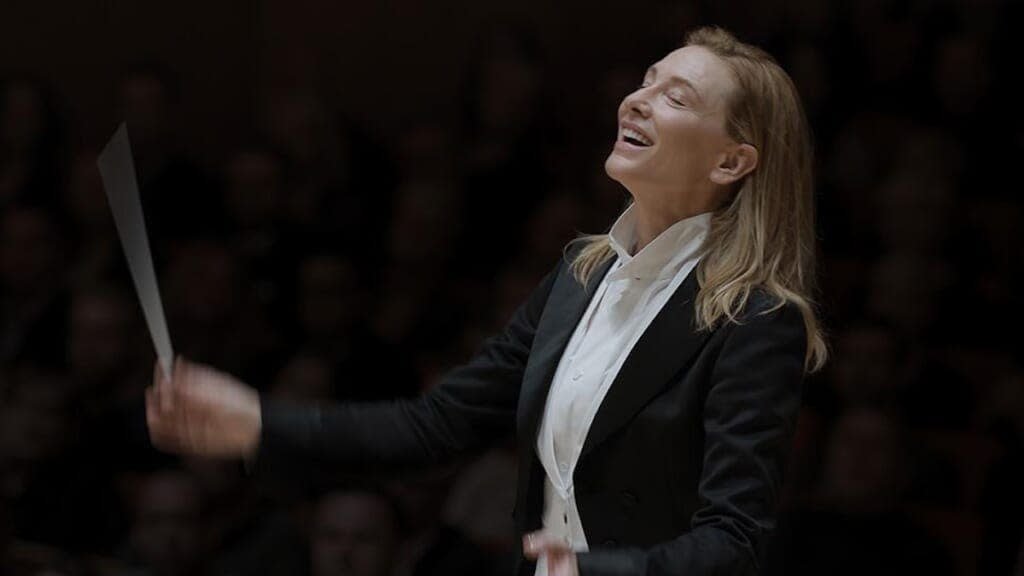Film review: Tár takes an ominous and breathtakingly crafted trip into rarefied world of classical music
Cate Blanchett is icily perfect as the elite conductor whose polished image starts to show cracks
Cate Blanchett hands in the performance of the year of a conductor whose power is going to her head.
Tár opens in Vancouver on October 21
TÁR AT FIRST FEELS like an astute character portrait, one that follows its titular character into the world of elite classical music. It’s a rarefied place where grand pianos sit in book-lined living rooms, conversations slip easily into German, everyone knows what “Chopin One” is, and conductors travel by private jet. So why do we feel such an impending sense of doom—like something terrible yet indiscernible is going to happen?
That’s largely thanks to writer-director Todd Field’s assured and exhilarating craftsmanship. In his hands, everything from a ticking metronome to the shadowy void of backstage helps build an ominous air around Cate Blanchett’s perfectionist conductor. It all makes Tár as arresting as it is uncategorizable.
Blanchett’s elegant, erudite Lydia Tár is a conductor so revered that, as she says in an early, extended interview with a New Yorker writer, being a woman in the male-dominated field is a nonissue. She is as attentive to the tailoring of her severe white shirts and black suits as she is to the intricacies of Mahler—whose enigmatic Fifth she is about to mount, post-pandemic, with the Berlin Philharmonic that she heads. She’s a genius who has a Harvard PhD, was mentored by Leonard Bernstein, studied music for five years in Peru, and founded a major charity to boost female conductors.
Lydia is witty and articulate, learned and passionate, powerful and privileged. But slowly we start to see the cracks in her finely polished image. At first they come in small acts of cruelty: the way she puts down a lesser conductor (Mark Strong) at lunch, suggesting he’s a “robot”; the way she casually mistreats her assistant, Francesca (Noémie Merlant), an aspiring maestro who can’t talk back because it would put her career at risk; or the way she confronts a child bully at her daughter’s private school (“I’m Petra’s father,” she hisses). Though married to her first-violinist wife (Nina Hoss), Lydia is also prone to using her position to pursue young female musicians—a lust that could be perilous in the #MeToo era, even for a woman, and yet she’s become impulsive and indiscrete. Watch the lengths Lydia will go to in an elaborate scheme to get a young Russian cellist (real musician Sophie Kauer) hired at the philharmonic. There’s a fantastic revealing scene where she takes the cellist to lunch, picking politely at her own plate while she watches the hearty Russian gorge herself.
In the performance of the year, Blanchett builds an icily perfect, titanium-strong, superconfident exterior, erupting into ecstatic release at the podium, the camera shooting her from below so she towers dramatically, stabbing the air in full frenzy. Blanchett finds the subtlest, smartest ways to suggest her character’s sadism—or the fact that Lydia may be becoming unhinged. Her most revealing moments are the ones where Lydia is alone with herself in the dark, and you’ll find yourself searching her face for answers. The writer-director has said the role was created for Blanchett, and it’s easy to see why.
Field grounds it all in a deeply researched classical-music world, where real names are dropped (Marin Alsop, “Lenny”, and—in a shout out that Vancouver Symphony Orchestra fans will get a legit kick out of—Andrew Crust and Otto Tausk). Fittingly, the filmmaker builds full, dark atmosphere with haunting orchestral works, from that mesmerizing, ever-mysterious Mahler to Elgar’s frantic cello concerto to Hildur Gudnadottir’s original score. Fans of classical music will glean entire extra layers of meaning and references throughout.
It’s better not to say more about what the omens portend. But don’t expect easy judgments or conclusions: Field’s film is thrillingly ambiguous in what it has to say about cancel culture, entitlement, obsession, and the abuse of power in the arts world. He’s also built an intricate suspense—one that’s less about what happens and more about discovering who this fascinating, flawed character actually is. In many ways Tár becomes as complex and enigmatic as that Mahler’s Fifth—and as bold and brainy as its protagonist.














